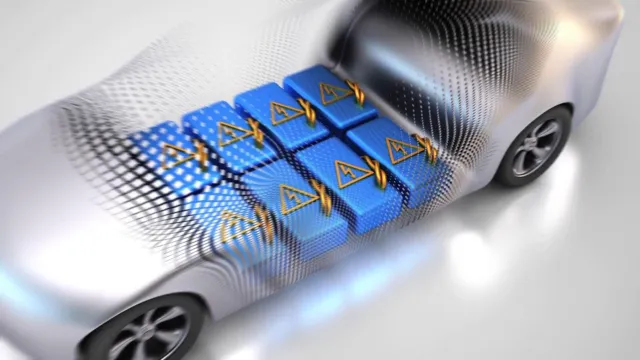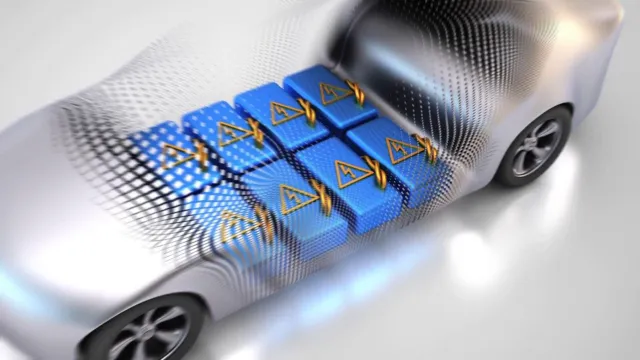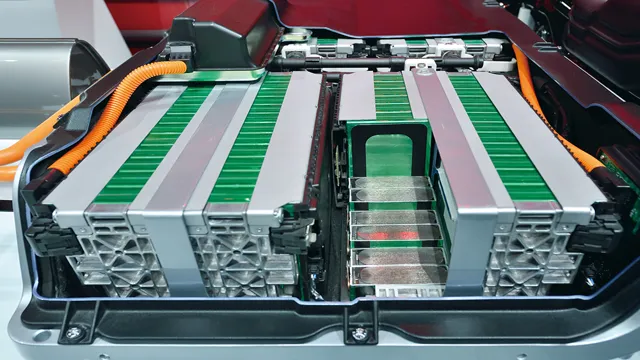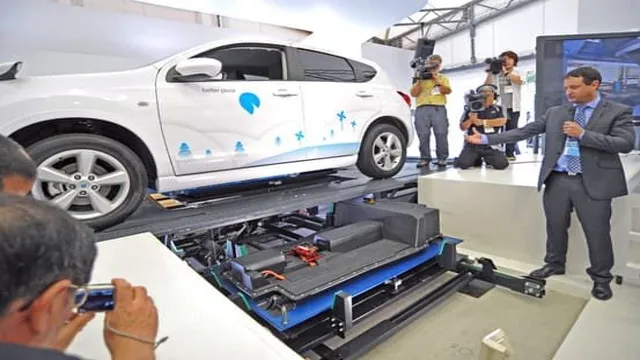The Shocking Truth About Electric Car Batteries: Everything You Need to Know!
Electric cars have come a long way from being science fiction to becoming an everyday reality. The technology has evolved so much that electric cars are now seen as a viable solution to the environmental impact of traditional combustion engines. In fact, as people are becoming more environmentally conscious, the demand for electric cars is on the rise.
But, how did we get here? How did electric cars evolve to what they are today? Let’s take a closer look at the evolution of electric cars.
Advantages of Electric Cars
Batteries are the heart of electric cars, and they offer numerous advantages over traditional fuel-powered vehicles. Firstly, they are more environmentally friendly, producing zero tailpipe emissions, resulting in cleaner air and fewer greenhouse gases. Moreover, the use of batteries greatly reduces our reliance on fossil fuels and the negative impact of oil drilling on our planet.
Additionally, batteries in electric vehicles require less maintenance compared to internal combustion engines, saving precious time and resources. Even more compelling, electric cars have a lower overall cost of ownership due to their increased energy efficiency, lower fuel costs, and longer lifespan of the battery. As technology improves, the range of electric cars is also increasing, making them a more viable option for long-distance travel.
The batteries used in electric cars have a bright future and are an important part of the transition to a more sustainable future.
Emission-free driving saves the environment
Electric cars have numerous advantages over traditional gas-powered vehicles. One of the most significant advantages is their eco-friendliness and ability to reduce harmful emissions. As electric cars run entirely on electricity, they do not produce any tailpipe emissions.
This makes them a much better alternative for the environment than conventional cars that emit harmful pollutants such as carbon dioxide, sulfur dioxide, nitrogen oxides, and particulate matter. By driving an electric car, you can significantly reduce your carbon footprint and contribute to a cleaner and healthier environment for future generations. Moreover, electric cars are much more energy-efficient than combustion engine cars, meaning they require less energy to travel the same distance.
This makes them both cost-effective and better for the environment. Overall, electric cars have numerous advantages that make them a better choice than traditional gas-powered vehicles, and they are undoubtedly the future of transportation.
Less noise pollution for quieter driving
Advantages of Electric Cars: Less noise pollution for quieter driving One of the significant advantages of electric cars is the reduced amount of noise pollution they produce compared to traditional gasoline or diesel cars. Electric cars make use of a motor that operates smoothly, without the need for excessive gears and pistons that produce loud and obnoxious noises. Electric cars effectively silence the excessive noise created by combustion engines, making for a more peaceful and relaxed driving experience.
The lack of engine noise also provides a safer driving experience by allowing drivers to hear their surroundings better while on the road. Additionally, the reduced amount of noise not only benefits drivers, but it also positively impacts the environment and communities near high-traffic areas by reducing ambient noise pollution levels. With quieter driving, electric cars provide a more comfortable and serene environment for both drivers and pedestrians alike.
In summary, the less noise pollution created by electric cars translates to greater convenience, safety, and peace of mind for all.
Fuel cost savings over gasoline-powered cars
Electric cars offer several advantages over traditional gasoline-powered ones, including significant fuel cost savings. While the upfront cost of electric cars may be higher than their gasoline counterparts, over time, the savings in fuel costs can more than make up for it. This is because the cost of charging an electric car is much lower than continually filling up a gas tank.
Additionally, electric cars are often more efficient than their gasoline counterparts, allowing drivers to get more mileage out of each charge. This not only saves money on fuel but also reduces greenhouse gas emissions and helps protect the environment. So, if you are looking to save money on fuel costs and contribute to a cleaner future, an electric car might be the perfect choice for you.
Electric Car Battery Technology
Batteries of electric cars are continually improving with new innovations and technology. There are various types of batteries used in electric cars, including Lithium-ion, Nickel Metal Hydride, and Lead Acid. Lithium-ion batteries have been the most popular type of battery used due to their high energy density, long service life, and faster charging time.
Additionally, their weight and size are smaller than most other batteries, making them a perfect fit for electric cars. There have been significant advancements in the technology of batteries, such as Silicon anodes, Solid-state batteries, and Lithium-sulfur batteries, which aim to increase energy density and lower production costs. The increased service life and energy density of the batteries will make electric cars more competitive in the automotive industry.
As the demand for electric cars increases, there is a need to improve battery technology and make them more accessible to the mass market.
Lithium-ion batteries dominate the industry
Electric car battery technology has come a long way over the years, and today, lithium-ion batteries dominate the industry. These powerful batteries are known for their high energy density and long lifespan, making them an ideal choice for electric cars. One of the key advantages of lithium-ion batteries is their ability to store more energy in a smaller space compared to other battery technologies.
This provides electric cars with longer range and better performance. Lithium-ion batteries are also known for their fast charging capabilities, allowing electric car owners to quickly top up their batteries while on the go. While there are other battery technologies available, including nickel-metal hydride and solid-state batteries, lithium-ion batteries remain the most popular choice for electric car manufacturers.
As the demand for electric cars continues to grow, we can expect to see even more advancements in electric car battery technology in the years to come.
Battery pack size, capacity, and range explained
Electric car battery technology has come a long way in the past few years, making electric vehicles (EVs) more mainstream than ever before. A key component of any EV is the battery pack. The size of the battery pack determines the overall range of the vehicle, while the battery capacity indicates how much energy the battery can store.
Generally, larger battery packs will allow for more range, but also cost more. The range of an electric car can also be affected by driving style, weather conditions, and terrain. As the technology continues to evolve, we can expect to see longer range and more efficient battery packs in the future.
So, when considering an electric car, it’s important to take into account the battery pack size and capacity in order to find the right fit for your needs.
New advances in solid-state batteries
Electric Car Battery Technology Electric cars have become increasingly popular in recent years, but their batteries still represent a major challenge. One promising solution is the development of solid-state batteries, which offer improved energy density, longer lifespan, and greater safety compared to traditional lithium-ion batteries. These batteries use a solid electrolyte instead of a liquid one, which means they can be made smaller and lighter while still delivering the same or greater amount of power.
Furthermore, solid-state batteries have fewer safety concerns since they are less likely to catch fire or explode. This makes them particularly appealing for electric cars, where safety is a top priority. While solid-state batteries are still in the research and development phase, there are already some prototypes available, and experts predict that they could become mainstream in the next few years.
If this happens, it could be a game-changer for the electric car industry, making electric cars even more practical and appealing to the general public.
Battery Development Challenges
As electric cars become more popular, the development of better batteries is crucial. However, creating batteries that can meet the needs of electric cars is a complex process with numerous challenges. One of the biggest challenges is the issue of range.
Currently, most electric cars can only travel a certain distance before requiring a recharge. This limits the appeal of electric cars as consumers worry about getting stranded on longer trips. Another key challenge is the cost of batteries.
While the technology is gradually becoming cheaper, the high cost of batteries remains a major barrier to mass adoption of electric cars. Finally, the issue of charging infrastructure also presents a challenge. It is important to develop charging infrastructure that can accommodate the growing number of electric cars on the road.
Despite these challenges, there is a tremendous opportunity for innovation in the battery industry, and many companies are working to develop batteries that are more efficient, longer-lasting, and cheaper. Through ongoing innovation, we can expect electric cars to become even more practical and affordable in the years to come.
Safety concerns surrounding battery fires
Battery development has come a long way in recent years, but there are still safety concerns surrounding the potential for battery fires. As batteries become more powerful and compact, they also become more susceptible to overheating and bursting. This is especially true for lithium-ion batteries, which are commonly used in portable devices such as smartphones and laptops.
In order to address these challenges, manufacturers are focusing on developing new battery technologies that are safer and more reliable. This includes improving the design of the battery itself, using new materials that are more resistant to heat, and incorporating advanced safety features that can detect and prevent potential hazards before they occur. While there is still much work to be done in this area, the future of battery development looks promising, with a focus on creating batteries that are not only more powerful and efficient, but also safer and more reliable for consumers.
High costs associated with developing new battery technology
Developing new battery technology can be an expensive endeavor, making it one of the key challenges that the industry faces. Companies working on improving the efficiency of batteries need to invest heavily in research and development to stay ahead of the curve. Large corporations like Tesla and LG Chem pour millions of dollars into battery research annually.
The high cost of building the manufacturing plants required to construct new batteries is also a major barrier to entry for smaller companies. With this in mind, it’s understandable why so few companies are working to create and improve battery technology. Without a doubt, high costs associated with developing new battery technology continue to hinder progress in this industry, making it challenging to meet the increasing demand for electric vehicles and renewable energy storage solutions.
The Future of Electric Car Batteries
Batteries of electric cars have come a long way in recent years and continue to evolve. The future of these batteries is promising, with advancements in energy density and longevity. Manufacturers are researching and developing new materials and battery designs to improve their performance, making them more reliable and efficient.
These advancements may lead to longer driving ranges, quicker charging times, and a decrease in the overall weight of the vehicle. Additionally, there is an increase in the use of recycled materials and sustainable production methods, ensuring a more environmentally friendly future for electric vehicles. Despite the promising future, it’s important to note that the technology is still relatively new, and improvements will take time.
As such, it’s essential to manage expectations and recognize that electric car batteries will continue to evolve. Ultimately the future of batteries of electric cars remains bright, and the advancements may help to shape a more sustainable future for transportation.
Conclusion
In the world of electric cars, the battery is the lifeblood of the vehicle. It holds the power that propels the car forward, and without it, an electric car would be little more than a fancy paperweight. So, next time someone asks you what makes electric cars go, just tell them that it’s all about the batteries.
Because when it comes to electric cars, the battery truly is the spark that ignites the revolution.”
FAQs
How long do the batteries of electric cars typically last?
The lifespan of electric car batteries varies, but they can typically last around 100,000 miles or more before needing to be replaced.
Are there any concerns with the environmental impact of disposing of electric car batteries?
Yes, the disposal of electric car batteries is a concern due to the potential for environmental damage from toxic materials. However, many efforts are being made to develop more sustainable and responsible methods of battery disposal and recycling.
Can electric car batteries be recharged at home, or do they require special charging stations?
Electric car batteries can be recharged at home using a charging station or a standard household outlet, but it may take longer than using a dedicated charging station.
How do the costs of replacing electric car batteries compare to the costs of regular maintenance for gasoline-powered cars?
Replacing an electric car battery can be a significant expense, but it may be similar to or even less expensive than the costs of regular maintenance for gasoline-powered cars, depending on the make and model of the vehicle.







